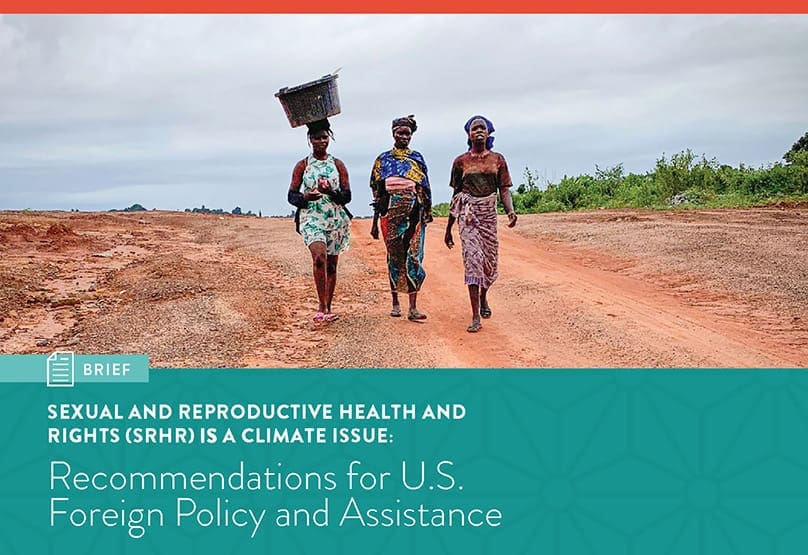
SRHR is a Climate Issue
Advocacy, Feminist Foreign Policy, Sexual and Reproductive Health and Rights
Recommendations for U.S. Foreign Policy and Assistance
2021
 Climate change is inextricably linked with sexual and reproductive health and rights (SRHR) and gender equality. Any efforts to mitigate and adapt to the impacts of climate change and environmental degradation therefore need to include SRHR and recognize and address systems of inequality, including both the racist and colonial roots of access to sexual and reproductive health and rights and impacts of
Climate change is inextricably linked with sexual and reproductive health and rights (SRHR) and gender equality. Any efforts to mitigate and adapt to the impacts of climate change and environmental degradation therefore need to include SRHR and recognize and address systems of inequality, including both the racist and colonial roots of access to sexual and reproductive health and rights and impacts of
climate change.
The worsening climate crisis is disrupting access to SRHR services, especially for groups that face additional barriers due to race, ability, indigeneity, sexual orientation or gender. Yet the solutions to both climate change and SRHR challenges are often couched in terms of individual responsibility to make a difference—for instance, by using public transportation—rather than changes by systems, governments and industries that can achieve impact at scale.
As one of the biggest contributors of climate emissions and the largest family planning donor, the United States (U.S.) in particular should take a leadership role in policy reform and industry regulation, in a manner that addresses the harmful impacts of climate change while advancing SRHR.
Key Recommendations for the U.S. Government
The following are a set of actions the administration should take to clearly integrate a focus on SRHR in its global efforts to mitigate and respond to the climate crisis:
1. Climate financing: Commit to gender mainstreaming 100 percent of all climate financing and to targeting gender equality in 20 percent of climate financing, as part of the climate financing plan. Within both funding streams, support for women’s rights organizations and Black, Indigenous and People of Color (BIPOC)-led organizations based in lower income countries should be increased, including for humanitarian response to climate disasters.
2. Personnel: Appoint a national gender and climate change lead to support the integration of intersectional gender considerations, including SRHR, into all aspects of White House climate change policy-making and coordination.50 Ensure there is both sufficient staff with gender and SRHR expertise, as well as widely-available training for all staff on the intersections of these issues and how to integrate them into climate mitigation and response.
3. Nationally determined contribution: Ensure the effective integration of gender equality considerations and human rights into the U.S.’ nationally determined contribution (NDC).
4. Data and evidence: Ensure that all climate change efforts disaggregate data by sex, age and other key demographic information specific to the country or region; data on gender equality impacts including SRHR are collected; and that there is investment in research where evidence gaps on the links between SRHR and climate data exist. This should include gaps on impacts to marginalized communities, including racial, ethnic, and religious minorities and LGBTQI+ people.
5. COVID-19 recovery: Take an integrated approach to address climate change, gender equality, and SRHR in COVID-19 response and recovery, and future pandemic prevention plans and actions.
6. Consultation and community engagement: Undertake a consultative process to hear from and design efforts along with impacted communities, especially youth, organizers, women of color and Indigenous people.
